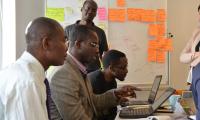Human rights help change development for the better

Is there more to development work than building wells, roads and schools? The answer is a resounding ‘yes’ according to the 20 participants who have just undergone a three week course on human rights based approach to development programming.
The course emphasizes the need for incorporating human rights in all aspects of the development work.
“A key principle is that the goal of development becomes both a realization of human rights and the more traditional goal of poverty reduction. And that requires a whole new mindset from the participants,” special adviser Una Verdel, who led the course, explains.
New way to work
Judging from the participants’ responses to the course, the changing of mindsets has happened.
“The course has given new insight on how to include human rights in our development work. Human rights must be included in all we do. People’s rights must be protected and respected throughout all aspects of the work,” senior district director Richmond Mensah of the Ghanaian Human Rights Commission says.
“I had a meeting with the president ofmy institution, and I told him about the HRBA and the principles, and the changes we need to makein our institution when we are planning or designing a new project, the need to take into account thehuman rights and so on. He agreedwith everything,” Dolly Aliaga of CARITAS Bolivia says.
The takeaways from participants are key to the Danish Institute for Human Rights.
“There were a lot of participants from state actors, and they have been doing development work for ages. But they were all very open and saw the usefulness of the human rights based approach,” Una Verdel explains.
Path to future work
The course is evaluated in three ways: anonymously, in plenary at the last day of training and by learning assessments prior to and after the course. This enables the institute to monitor the learning experience. The participants offered very positive reviews:
“It has been one week since we completed the course. The usefulness of this course my work and my personal carrier goals cannot be overstated. It has changed me and the work I do in many ways,” Abdul Fatawu Tambro from Action Aid, Global Platform Ghana, said.
But the answers are not only used as a pad on the shoulder for the organisers of the course.
“These courses are tests of whether human rights based approach actually can spur change. These responses show that it absolutely can – and we take the experience onwards in our future work on human rights based approach,” Una Verdel says.
